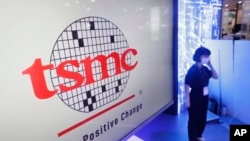Taiwan President Lai Ching-te pledged on Friday to talk with the United States about President Donald Trump’s concerns over the chip industry and to increase U.S. investment and buy more from the country, while also spending more on defense.
Trump spoke critically about Taiwan on Thursday, saying he aimed to restore U.S. manufacturing of semiconductor chips and repeating claims about Taiwan having taken away the industry he wanted back in the United States.
Speaking to reporters after holding a meeting of the National Security Council at the presidential office, Lai said that the global semiconductor supply chain is an ecosystem in which the division of work among various countries is important.
“We of course are aware of President Trump’s concerns,” Lai said.
“Taiwan’s government will communicate and discuss with the semiconductor industry and come up with good strategies. Then we will come up with good proposals and engage in further discussions with the United States,” he added.
Democratic countries including the United States should come together to build a global alliance for AI chips and a “democratic supply chain” for advanced chips, Lai said.
“While admittedly we have the advantage in semiconductors, we also see it as Taiwan’s responsibility to contribute to the prosperity of the international community.”
Taiwan is home to the world’s largest contract chipmaker, TSMC, a major supplier to companies including Apple and Nvidia, and a crucial part of the developing AI industry.
TSMC is investing $65 billion in new factories in the U.S. state of Arizona, a project begun in 2020 under Trump’s first administration.
TSMC’s Taipei-listed shares closed down 2.8% on Friday, underperforming the broader market, which ended off 1.1%.
A senior Taiwan security official, speaking to reporters on condition of anonymity in order to speak more freely, said if TSMC judged it was feasible to increase its U.S. investment, Taiwan’s government would help in talks with the United States.
TSMC did not immediately respond to a request for comment.
The official added that communications between Taiwan and U.S. economic, security and defense officials at present was “quite good” and “strong support from the United States can be felt”.
US support
The United States, like most countries, has no formal diplomatic ties with Chinese-claimed Taiwan, but is the democratically governed island’s most important international backer and arms supplier.
Trump cheered Taiwan last week after a joint U.S.-Japan statement following Japanese Prime Minister Shigeru Ishiba’s visit to Washington called for “maintaining peace and stability across the Taiwan Strait” and voiced support for “Taiwan’s meaningful participation in international organizations.”
But Taiwan also runs a large trade surplus with the United States, which surged 83% last year, with the island’s exports to the U.S. hitting a record $111.4 billion, driven by demand for high-tech products such as semiconductors.
Lai said that the United States is Taiwan’s largest foreign investment destination, and that Taiwan is the United States’ most reliable trade partner.
Trump has also previously criticized Taiwan, which faces a growing military threat from China, for not spending enough on defense, a criticism he has made of many U.S. allies.
“Taiwan must demonstrate our determination to defend ourselves,” Lai said, adding his government is working to propose a special budget this year to boost defense spending from 2.5% of its GDP to 3%.
His government is involved in a standoff with parliament, where opposition parties hold a majority, over cuts to the budget, including defense spending.
“Certainly, more and more friends and allies have expressed concern to us, worried whether Taiwan’s determination for its self-defense has weakened,” Lai said.


